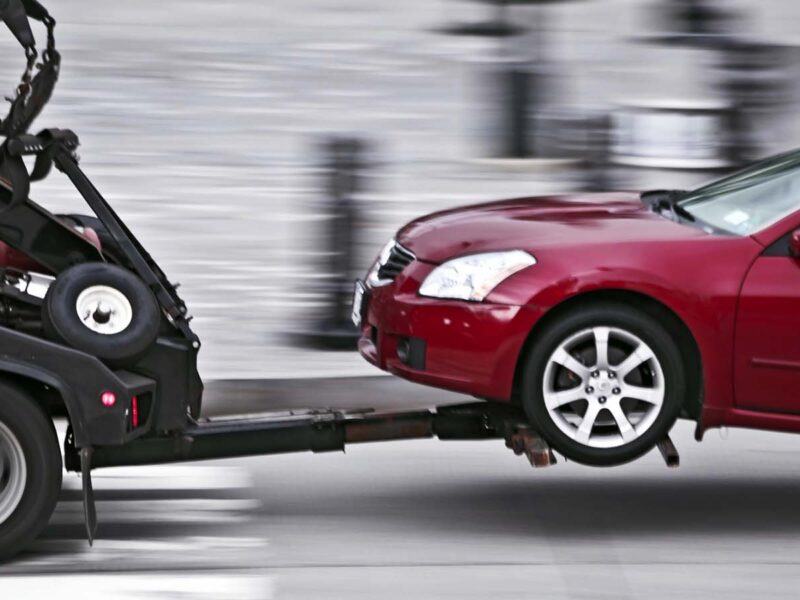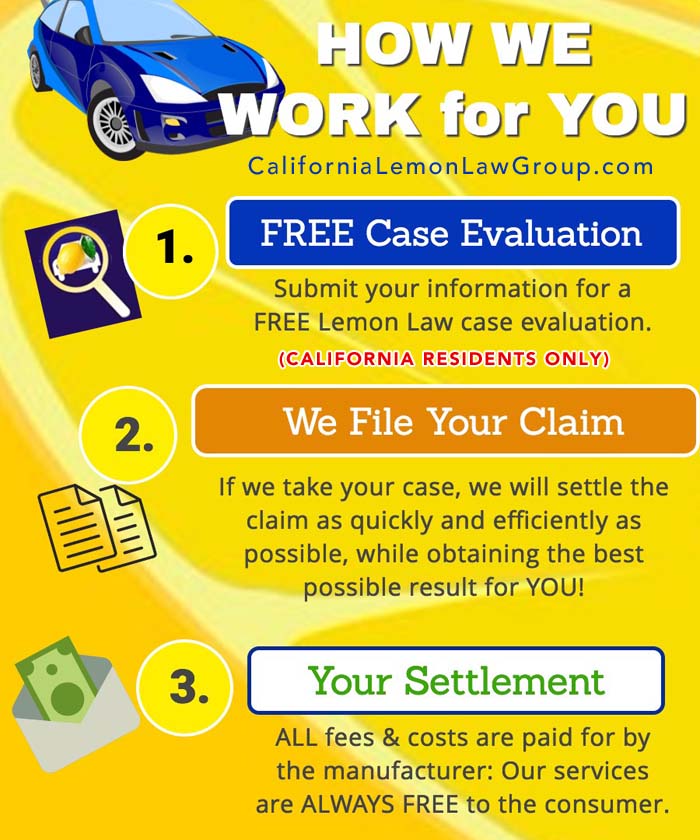The California Lemon Law Group has successfully settled thousands of lemon law cases for California residents. Case settlements vary among vehicle owners and their particular situation. However, all California lemon law cases must meet certain requirements, such as:
- The vehicle meets all of the requirements to file a lemon law case.
- The vehicle was purchased, registered, and repaired in the state of California.
- The defect substantially impaired the use, value or safety of the vehicle.
What do ALL of Our Lemon Law Cases Have in Common?

The “No Fees Until You Win,” or “No Upfront Fees” policy used by other law firms does not apply at our firm! NONE of our clients pay us ANYTHING — up front, or when they win — to settle their case! ALL fees and costs are paid for by the manufacturer; Not our clients!

What Makes Your Vehicle a Lemon?
Not all problematic cars and trucks are considered “lemons.”
We all expect our new car to operate properly. As extremely annoying as it may be, defects such as radio, bluetooth, wind noise, or navigation system not working correctly do not rise to the level of a “substantial impairment” under the law.
What makes your vehicle a candidate for a Lemon Law case? In order for us to obtain a full lemon law repurchase for you pursuant to California’s Lemon Law, we have to prove 3 things:
- Your vehicle was taken to a factory authorized dealership for a specific defect four or more times (for the exact SAME problem each time); and
- The defect cannot be repaired under the original factory warranty after four or more repair visits; and
- The defect substantially impairs your use, value, or safety.
Did You Purchase and Register Your Vehicle in California?
Not all states have lemon laws. California has one of the strongest and most pro-consumer lemon laws in the entire country.
The California Lemon Law Group, Inc., has offices located throughout the state of California and represents consumers statewide.
Contact Us
The California Lemon Law Group works only with California residents.

Substantial Impairment
Is Your Vehicle Substantially Impaired?
The substantial impairment requirement means that your vehicle’s defect needs to be serious enough that it severely impacted your use, value, or safety. If you are putting more than 20,000 miles on your vehicle per year, this makes it extremely difficult to prove that your use, value, or safety have been substantially impaired.
Don’t count on the dealership to have an accurate record of every time you have brought your vehicle in for repair(s) and exactly what measures they took in an attempt to remedy the situation.
When you take your car into the dealership for a warranty repair, make sure that your service advisor accurately records your complaint on the repair order, and make sure that you do not leave the dealership without a copy of the repair order. In addition, when you pick your vehicle up after the repair has been performed, look at the repair invoice and make sure that it actually states what was repaired. Do not sign the repair order until you have read it and it matches up with what your service advisor told you.
Our Firm Charges Nothing to Our Clients
Under the California Lemon Law, we recover 100% of our attorney’s fees and costs from the defendant. The automobile manufacturer is required to pay all reasonable attorney’s fees and costs to Plaintiff’s attorney if that attorney wins the case!
In addition, you don’t pay for our:
- travel and lodging,
- office supplies,
- postage,
- assistance from private investigators, or
- automotive expert inspections on your vehicle
Plus: If we need to hire an expert witness, we pay their fees. Do not sign a retainer agreement that gives an attorney YOUR money!
Still not sure whether your new, used, or leased vehicle can be considered a lemon under the California Lemon Law?
Give us a call at 1-855-595-3666

The Most Common Vehicle Defects Resulting in a Lemon Law Case
The majority of our lemon law cases have involved faulty transmissions and engines, with the greatest number of these cases being among Ford and GM owners. With each make and model, the defect may vary slightly, but overall, the main problems have been:
FORD DEFECTS
- Shuddering
- Hesitating
- Lacking power, stalling
- Activation of the “Transmission Overheat” warning light
- Activation of the “Check Engine” warning light
- Grinding
Related Ford Articles:
GM DEFECTS
- Sputtering and stalling
- Engine vibrations
- Steering locks up
- Check engine light activating
- Hesitation or lagging upon acceleration
- Loss of power
Related GM Articles:


 Nissan Lemon Law Cases for CVT Transmission
Nissan Lemon Law Cases for CVT Transmission